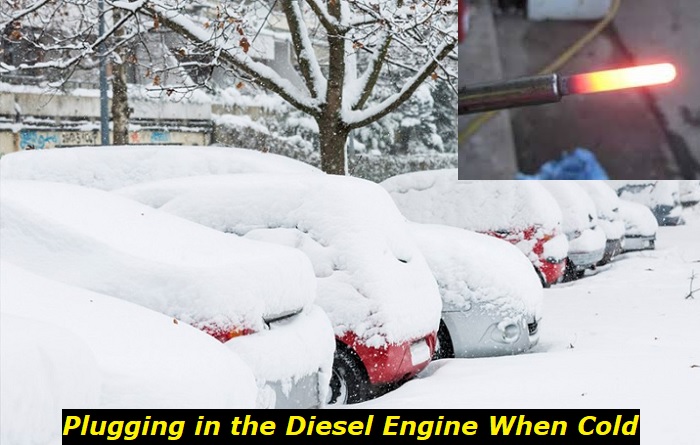If you have driven during winter, even once, you probably know that you should plug in your diesel engine for it to start. However, the question is, when exactly are you supposed to plug it in, and how long should it stay plugged in?
Read on, we have the answers to your questions.
Many who live in extremely cold areas wish they had a choice besides driving. However, they must get to their offices, drop their children at school, grocery shop, and run other general errands.

While mild winter does not get too hard on the engine, extreme cold makes it difficult for diesel vehicles to start normally. Just like us, our cars do not like the cold very much. Thankfully, many diesel vehicles are equipped with engine block heaters. The heater keeps your engine warm during winter and enables it to keep running normally.
What is Engine Block Heater, and What Does it Do?
An engine block heater is used to warm your diesel engine and motor fluids during cold seasons. This device is essential to your diesel vehicle as it protects your engine from damage when the cold becomes extreme. It reduces the risk of engine damage from cold starts. When you start your diesel truck after using the engine block heater, engine fluids reach optimal performance temperatures much faster.
It is crucial to warm engine fluids before starting the vehicle in frigid seasons. Cold can cause your motor oil to become thick and sludge, causing engine parts to scrape against each other.
Although you can warm up the fluids by idling the engine, professional mechanics do not recommend it. Warming the oil using the engine block heater increases fuel economy and minimizes emissions. The heater also heats the engine coolant, which regulates your vehicle's interior temperature, reducing the time it takes to heat your car.
When Should You Plug In Your Truck?
The exact temperature you should plug in your diesel truck varies because engines are different. The most crucial thing to remember is that if it is going to be extremely cold at night or early morning hours, you should plug in your diesel engine. There are several things to consider when plugging in your engine block heater.
You should plug in the engine block heater when the temperature goes below 5°F. Generally, new trucks can start at temperatures as low as -22°F. However, igniting the engine without using the engine block heater is not advisable. This causes your diesel engine to strain more than it should. Using the engine block heater helps protect the engine from straining unnecessarily.
Experts advise that you should not leave your truck unplugged when the temperature drops below 5°F. Some older diesel trucks will not even start once the temperature reaches 40° F and below.
How Long Should You Plug In the Engine Block Heater?
As seen above, you cannot exactly know when to plug in the engine block heater. Likewise, you cannot generalize how many minutes or hours it takes to heat the engine. One thing that is sure about plugging in your diesel engine is that you cannot plug it in for more than four hours.
Much like when you need to plug in your engine block heater, there is no rule of thumb about how long it should remain plugged in. It is equally useless to plug in the heater and leave it running overnight. That will be a waste of electricity - you should time a few hours before dawn. Two or three hours before you drive is enough for the engine to heat up.
Watch the outside temperature to determine how long the engine block heater needs to remain plugged in. There is the option of buying a block heater timer that shuts it off once the required time elapses. This will help you save both time and electricity.
Do You Have to Use the Engine Block Heater? Alternative Solutions
Starting your diesel truck without heating it in cold weather can strain the engine considerably. The engine block heater raises the oil and other fluid temperatures to the required levels, allowing the appropriate viscosity.
However, the following are alternative considerations for drivers who do not want to plug in their trucks. They will not be as effective as plugging in the block heater, but they will get your day started.
- Keep the Battery Warm
Cold temperatures weaken car batteries. This explains why electric vehicles have reduced mileage per charge during cold seasons. To ensure that cold weather does not reduce your engine's potency and life span, keep it warm when you are not driving. You can either place a warmer beneath the battery or wrap it well with a blanket warmer.
If the cold gets to your battery, it may weaken it, making it hard to start your car, even when you plug in the engine block heater.
- Clean the Fuel Filter Regularly
Although the ultimate safe option to keep your engine ready to run is plugging in the heater, cleaning the fuel filter could help you start the engine in the morning. Inspect your fuel filter routinely during cold seasons to ensure it is always clean.
Some people think that the heater is a waste of electricity. However, plugging in your diesel truck protects it from many unwelcome repairs in the future. You do not lose anything by using the engine block heater. It is harmless to your engine.
- Always Fill Up Your Fuel Tank before Parking
Always pass the fuel station to fill your diesel tank before parking. Cold temperatures cause condensation to build on the tank walls, causing the fuel to gel.
Experts also recommend that you use fuel with additives during the winter. These fuels are very costly, but they are worth every penny. They keep the fuel from freezing when temperatures drop to freezing points.
- Allow the Engine Time to Warm Up During Start-Up
Allowing your diesel engine enough time to warm up before heading out has more advantages than you can mention. Few people can connect their trucks' excessive fuel and oil consumption to cold weather and conditions. Your driving habits can significantly affect your diesel engine's performance and life span.
When you start your engine in the morning during cold weather, allow enough time to warm up. This minimizes the amount of straining your engine has to endure. If you start and head out immediately, you force your engine to work harder than it should; as a result, it will consume more fuel and oil than average.
The ideal time you allow your truck to warm up depends on your vehicle and the day's temperature.
What if You Forgot to Plug In Your Diesel Engine?
Diesel engines are problematic during winter and extremely cold conditions. Diesel fuel contains hydrocarbons that solidify in icy conditions, turning the diesel into a gel that cannot flow, causing the engine not to start.
Experts recommend diesel drivers invest in winter fuels with additives that lower freezing points. However, despite all these alternatives, some icy conditions will not respond to anything other than the engine block heater.
If your vehicle refuses to start, you can check for faulty spark plugs and glow plugs. However, checking the dipstick will give you a quick answer to the problem. The engine oil has become near solid because of the low temperatures.
Conclusion
I hope we have satisfactorily answered your concerns and questions about plugging in your engine block heater. In cold weather, plugging in your diesel engine ensures it does not strain when you start it in the morning.
The longest you will ever need to plug in your diesel engine is four hours. After that, you will only waste electricity. However, you can keep an eye on the outside temperature to determine whether to keep it plugged in longer or to unplug it earlier. Do not plug in your engine overnight. You should time a few hours before you start your engine. Two or three hours is enough time, depending on the day's temperature and your truck's condition.
About the authors
The CarAraC research team is composed of seasoned auto mechanics and automotive industry professionals, including individuals with advanced degrees and certifications in their field. Our team members boast prestigious credentials, reflecting their extensive knowledge and skills. These qualifications include: IMI: Institute of the Motor Industry, ASE-Certified Master Automobile Technicians; Coventry University, Graduate of MA in Automotive Journalism; Politecnico di Torino, Italy, MS Automotive Engineering; Ss. Cyril and Methodius University in Skopje, Mechanical University in Skopje; TOC Automotive College; DHA Suffa University, Department of Mechanical Engineering






Add comment